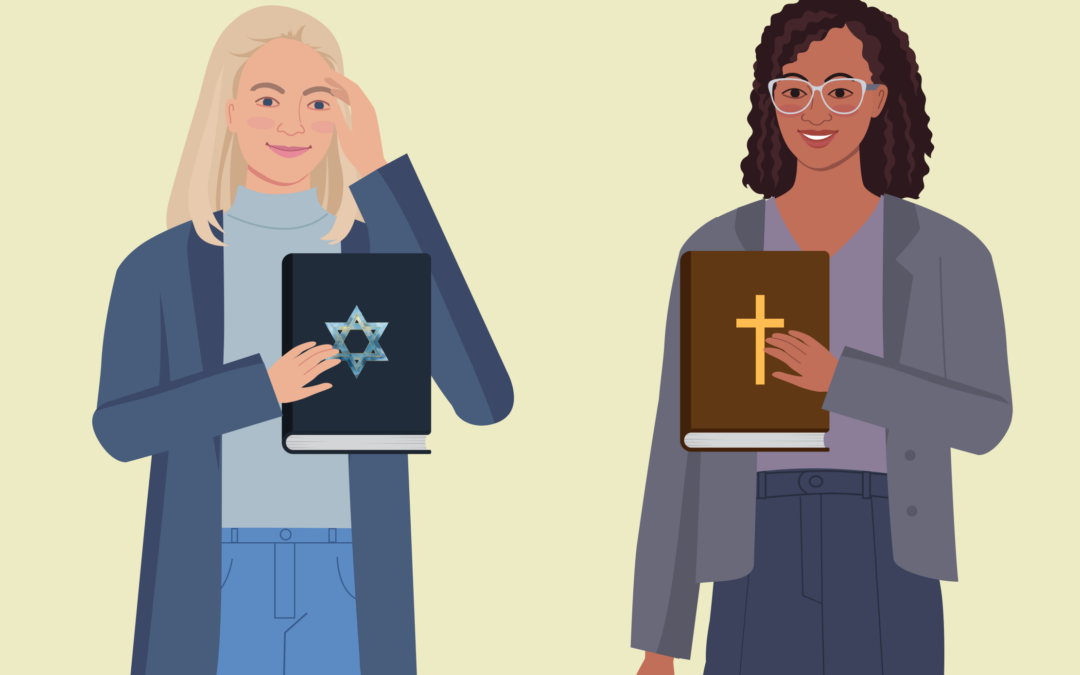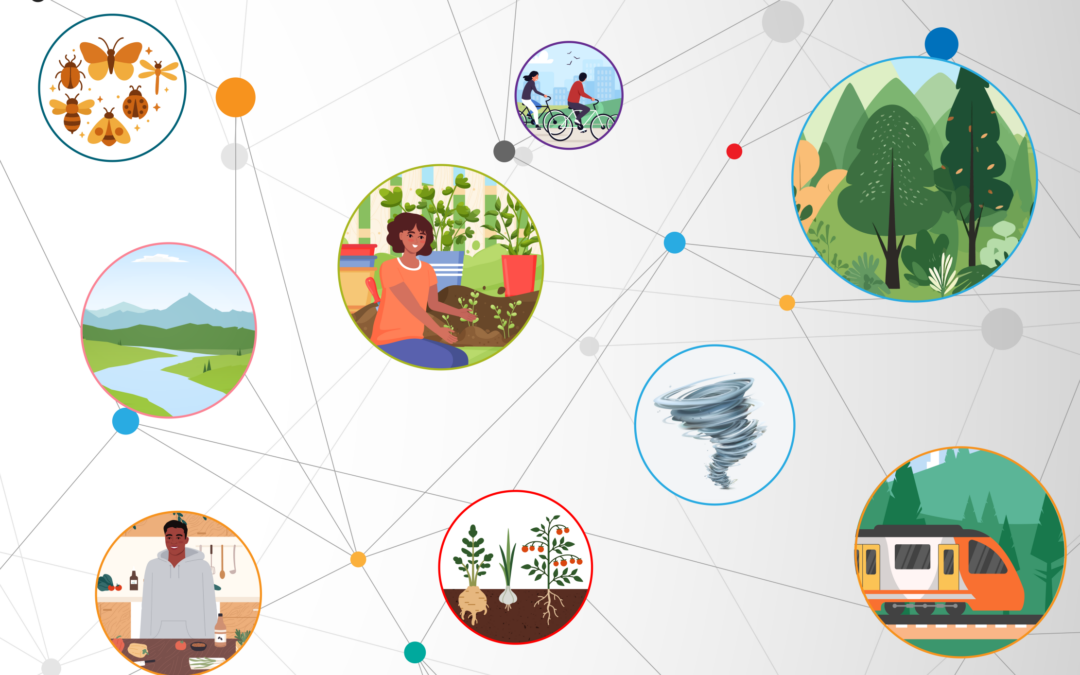Social and Behavioural
Explore Social and Behavioural

Dr Ori Soltes | The War Within: How Our Search for Meaning Can Unite or Divide Us
Religion has long helped people make sense of the world, but as Dr Ori Soltes argues in a recent paper, this guidance comes with deep complications. Even the word religion contains a puzzle. It stems from the Latin religio, meaning ‘to bind back’, which immediately raises the question of what we are trying to reconnect with in the first place. That act of binding back is ultimately tied to a search for meaning – a deep human need to understand our place in the world and how we relate to everything around us. Across history, people have turned to religion to navigate existence, mortality, and uncertainty. But trying to understand that source of meaning, and then expressing it through the limitations of human language, is where the real trouble begins.

Dr Luca Nitschke | A Social-Ecological Model of How Daily Routines Intertwine with Nature
Everyday activities such as gardening or commuting might not seem like they have much to do with global environmental crises – but a new study led by Luca Nitschke argues otherwise. He and his colleagues, Lukas Sattlegger and Immanuel Stieß at the Institute for Social-Ecological Research (ISOE), introduced the idea of ‘social-ecological practices’ to show how our daily routines are deeply connected to the integrity of the natural world.

Dr Sunny Sui-Kwong Lam | Running Together Apart: How a Runners’ Group Stayed Connected During Lockdown
When Hong Kong went into pandemic lockdown, the city’s bustling harbourfront became relatively quiet, with only lone runners wearing masks. However, one local running group refused to let social isolation stop them. The Hong Kong Harbour Runners – a community of recreational joggers who met weekly for “harbour runs” – found creative ways to stay active and connected, even as restrictions shut down public gatherings. In a new study, Dr Sunny Sui-Kwong Lam of Hong Kong Metropolitan University explored how this community-led recreational running group kept its members motivated and emotionally supported.

How Chinese Words Transform When They Enter Mongolic Languages
When languages come into contact, they often borrow words from each other. But what happens if the donor-recipient language pairs are similar but set in different sociolinguistic contexts? Do they develop the same strategies, or do they find their own unique paths? Dr Julie Lefort of Ca’ Foscari University of Venice examines how Chinese adjectives are integrated into two Mongolic languages spoken in China: the Dörbed Mongolian Community Language (or ‘DMCL’ for short), spoken in Heilongjiang, and the Dongxiang language, spoken in Gansu.

Dr Tim Wharton | Understanding the Role of Emotions in Human Communication
Emotional communication is fundamental to human interaction, and plays a key role in the way humans connect with each another. However, precisely what emotions communicate and how they do so remains little understood. Dr Tim Wharton, a linguist based at the University of Brighton, is leading an ambitious research project that aims to change that. Drawing together insights from pragmatics – the study of utterance interpretation – linguistics, psychology, and neuroscience, his team’s work seeks to better understand the role of emotions in human communication.

Dr Johanna Lynch | Promoting Patients’ Sensations of Safety Can Transform Healthcare
What if the key to better healthcare wasn’t just treating symptoms, but helping people feel fundamentally safe? Dr Johanna Lynch at the University of Queensland, alongside her international research team, has developed what is now called the ‘Sense of Safety Theoretical Framework’ – a comprehensive approach that recognises feeling safe as a fundamental prerequisite for health. Their project involved transdisciplinary research into the neuroendocrinology, psychophysiology, and population impacts of threat, and extensive conversations with healthcare practitioners, mental health clinicians, and people with lived experience of illness across Australia and beyond.

Dr Cees Hamelink | Conflict is Inherent to Humanity, But How Can We Stop It Escalating into Violence?
Humans have a great capacity to care for the needs of others. Despite this, disagreements and disputes are an inherent part of human existence. So, what if the key to preventing conflicts from spiralling into mass violence isn’t avoiding disagreement altogether, but learning to communicate with compassion? New research from Dr Cees Hamelink at the University of Amsterdam suggests that, while we cannot eliminate human conflict, we can learn to tame its most destructive potential. His research challenges the widespread belief that conflicts can and should always be prevented, arguing instead that conflict often serves positive purposes in science, democracy, and personal development.
This video provides information to help you navigate emergency department visits to ensure your loved one receives effective care. The focus will be on how to manage seizure emergencies – either seizures arising for the first time or those caused by epilepsy.

Professor Olya Bryksina | The Unexpected Power of Helping Others: What Drives Us in Groups
We often assume that people are most motivated by activities that help them generate their own progress towards the goals they are aiming to achieve. In the context of personal goals, such as advancing one’s own career it is certainly true, as the benefits are direct and obvious. But research by Professor Olya Bryksina of the University of Winnipeg suggests that this common belief misses something powerful: in group settings, when working towards collective goals and outcomes, we may be more motivated by helping others than by helping ourselves.

Dr Monica Pauls | Understanding Collective Identity Among Youth Activists Online
Can collective identity among social movement actors develop online? Do social media platforms foster genuine relationships, or do meaningful connections require face-to-face interaction? New research by Dr Monica Pauls at Mount Royal University aimed to find out. Her latest study dives into the digital lives of youth activists to explore whether social media can foster a genuine sense of belonging and shared purpose.

Professor Kimani Nehusi | How Ancient Rituals Created Sacred Homelands
Land ownership disputes and displacement affect millions across Africa and its diaspora today, but understanding the profound spiritual relationship between African communities and their ancestral territories requires looking far back into history. Professor Kimani Nehusi at Temple University examines how African communities developed what he calls the ‘Afrikan Ancestral Land Complex’ – a distinctive collection of values, deep memory, knowledge, attitudes and rituals centered on land. His research focuses on ancient Kemet, known today as Egypt, where some of the earliest written records provide evidence of these practices dating back over 5,000 years.

Professor Penelope Corfield | Time-Space: Exploring How Humans Navigate Cosmic Existence
Yes, the clock is ticking away relentlessly! And yet today we live in an era when some philosophers claim that Time is merely an illusion. And certainly, many people casually dismiss all historical understanding as irrelevant. However, it’s time to rethink! We need to understand humanity’s place in time and space. And that’s particularly vital for addressing contemporary crises, especially climate change, which demands collective action based on both historical and scientific insights. Professor Penelope Corfield at Royal Holloway, University of London, has written a new book called Time-Space: We Are All in It Together. It offers a ground-breaking interdisciplinary exploration of how humans exist within the cosmic dimensions of Time and Space.

Professor Mark D. Hayward | How Education Shapes Dementia Risk
Dementia – a syndrome characterized by declining cognitive function that interferes with daily living – represents one of the most significant health challenges facing aging populations worldwide. While sometimes viewed as an inevitable consequence of aging, research increasingly shows that dementia risk can be modified through life experiences. For instance, higher levels of education are associated with lower risk of dementia, but the exact relationship between years of schooling and cognitive health remains an important area of investigation. Professor Mark Hayward at the University of Texas at Austin and his colleagues, Hyungmin Cha and Mateo Farina, recently explored how education affects dementia risk and onset timing, as well as prevalence trends across different population groups.
Stay Up To Date With SciTube
